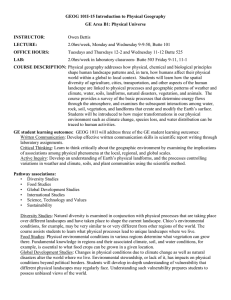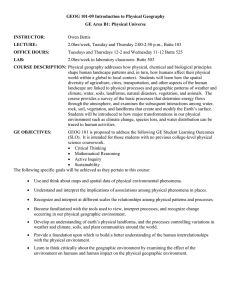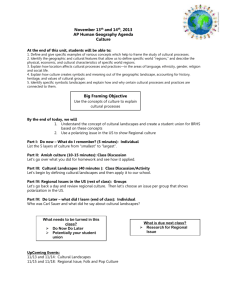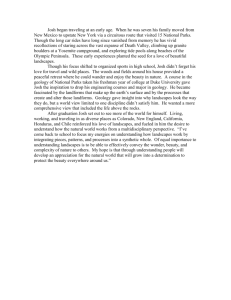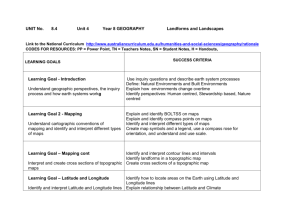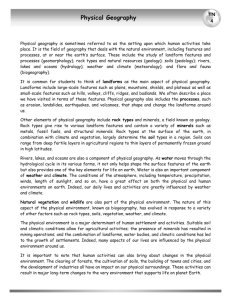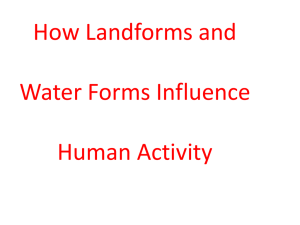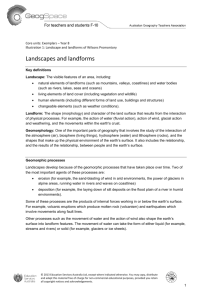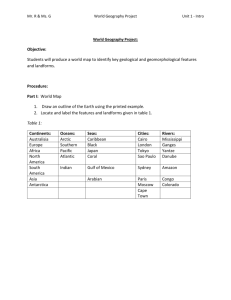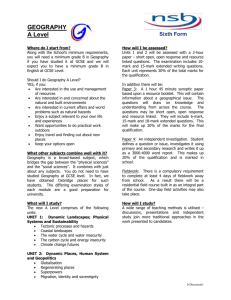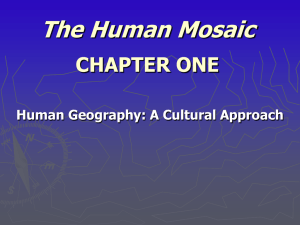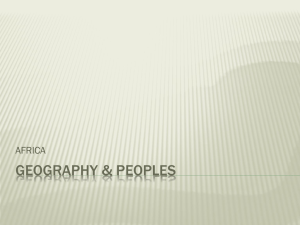GEOG 101 Section 04, 05, 06
advertisement
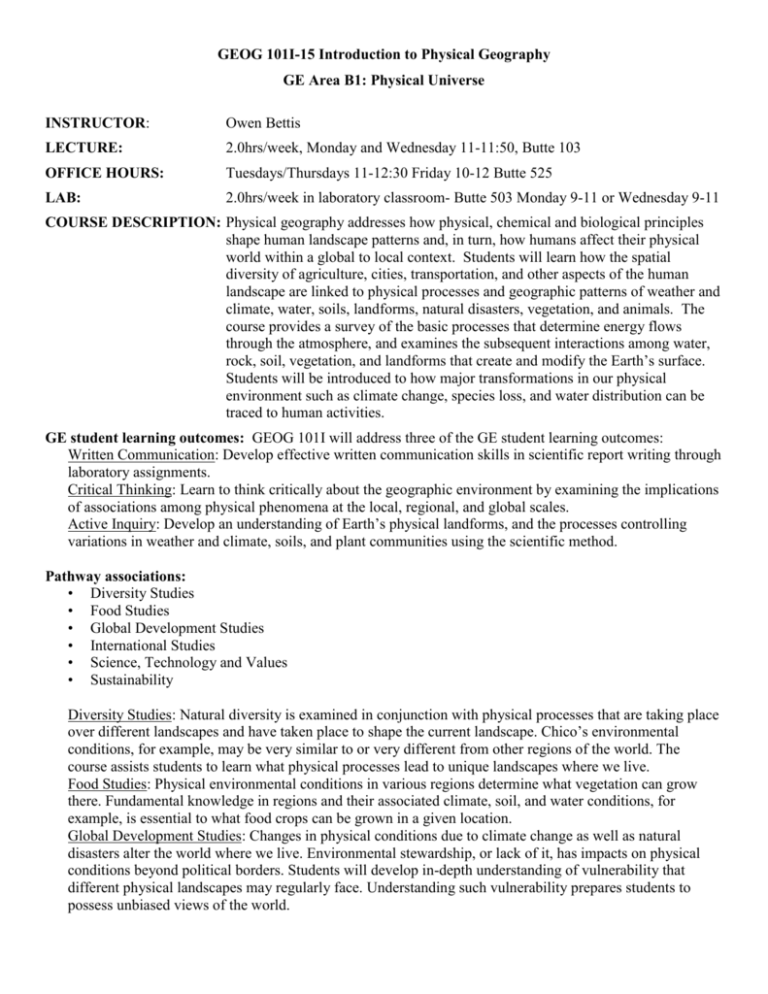
GEOG 101I-15 Introduction to Physical Geography GE Area B1: Physical Universe INSTRUCTOR: Owen Bettis LECTURE: 2.0hrs/week, Monday and Wednesday 11-11:50, Butte 103 OFFICE HOURS: Tuesdays/Thursdays 11-12:30 Friday 10-12 Butte 525 LAB: 2.0hrs/week in laboratory classroom- Butte 503 Monday 9-11 or Wednesday 9-11 COURSE DESCRIPTION: Physical geography addresses how physical, chemical and biological principles shape human landscape patterns and, in turn, how humans affect their physical world within a global to local context. Students will learn how the spatial diversity of agriculture, cities, transportation, and other aspects of the human landscape are linked to physical processes and geographic patterns of weather and climate, water, soils, landforms, natural disasters, vegetation, and animals. The course provides a survey of the basic processes that determine energy flows through the atmosphere, and examines the subsequent interactions among water, rock, soil, vegetation, and landforms that create and modify the Earth’s surface. Students will be introduced to how major transformations in our physical environment such as climate change, species loss, and water distribution can be traced to human activities. GE student learning outcomes: GEOG 101I will address three of the GE student learning outcomes: Written Communication: Develop effective written communication skills in scientific report writing through laboratory assignments. Critical Thinking: Learn to think critically about the geographic environment by examining the implications of associations among physical phenomena at the local, regional, and global scales. Active Inquiry: Develop an understanding of Earth’s physical landforms, and the processes controlling variations in weather and climate, soils, and plant communities using the scientific method. Pathway associations: • Diversity Studies • Food Studies • Global Development Studies • International Studies • Science, Technology and Values • Sustainability Diversity Studies: Natural diversity is examined in conjunction with physical processes that are taking place over different landscapes and have taken place to shape the current landscape. Chico’s environmental conditions, for example, may be very similar to or very different from other regions of the world. The course assists students to learn what physical processes lead to unique landscapes where we live. Food Studies: Physical environmental conditions in various regions determine what vegetation can grow there. Fundamental knowledge in regions and their associated climate, soil, and water conditions, for example, is essential to what food crops can be grown in a given location. Global Development Studies: Changes in physical conditions due to climate change as well as natural disasters alter the world where we live. Environmental stewardship, or lack of it, has impacts on physical conditions beyond political borders. Students will develop in-depth understanding of vulnerability that different physical landscapes may regularly face. Understanding such vulnerability prepares students to possess unbiased views of the world. International Studies: Different from political borders, physical landscape typically changes gradually from country to country. Different physical landscapes and environmental conditions make given regions unique. Students will learn to appreciate different landscapes and the physical environment, within which we live and develop unique ways of life. Science, Technology and Values: We are increasingly aware of our physical environment that surrounds us and how it impacts our lives. The course helps students to think with scientific method, use scientific notations, and read critically with physical processes in related fields of study. Sustainability: Our everyday lives are closely related to the physical environment within which we reside. Through our everyday lives, we are active players involved in changes in physical landscapes and we experience feedback from the natural environment that we have modified. Through the course, students will learn fundamentals of physical processes on physical landscapes so that they will be aware of the impacts that their actions may lead to. ORGANIZATION: The course is based on four units: Energy-atmosphere system; water, weather, and climate systems; Soils, ecosystems and biomes; and Earth surfaceatmosphere Interface. These units will introduce students to fundamentals (energy and matter), processes, interactions, scientific analysis methods and spatial patterns within the physical geographic environment, which are associated with the atmosphere, hydrosphere, lithosphere, and biosphere. REQUIREMENTS: Students are responsible for all class materials and should be prepared for lectures by reading the assigned textbook sections before class and laboratory assignments. Students must print all labs before coming to the lab meeting. Labs will be posted on Blackboard Learn. CORE TEXT(S): Christopherson (2011). Geosystems. 8th Edition, John Wiley Press, NY. Additional web-based materials available on BlackBoard Learn GRADING POLICIES: Will be determined by scores on the three lecture midterm examinations, the lecture final examination, reading quizzes, laboratory assignments and lab final exam as follows*: First Exam Second Exam Third Exam Final Examination Lab Component 60 points 60 points 80 points 100 points 300 points Total 600 points * Point system is subject to change Attendance policy: Attendance is expected at every class and lab meeting. I understand, however, that personal things happen during any semester that may keep you from class. Rather than punish you for not showing up (your grade will most likely drop by itself) I will give you 20 extra credit points if you do not miss a single class or lab. If you miss only one class/lab you will get 15 points, missing two classes/labs gets you 10 points, and missing three classes/labs gets you 5 points. Points will be awarded at the end of the semester. “Excused” absences will not count as missed classes, though you will need to speak with me in person to get any absence excused. Course Etiquette: Minor requests: Please, turn off cell phones in lecture and lab to avoid disruption. Please do not eat in lecture or lab (we’re ALL hungry!). Please do not bring drinks in glass bottles into lecture or lab. § Student assignments will be handed back promptly in lab section. Any material not picked up in lecture/lab will be discarded at the end of the semester. Final papers will be held for one semester. Disability Support Services: If you have a documented disability that may require reasonable accommodations, please contact Disability Support Services (DSS) for coordination of your academic accommodations. DSS is located in the Student Services building across from Merriam Library. The DSS phone number is 898-5959 or FAX 898-4411. Visit the DSS website at http://www.csuchico.edu/dss/. Statement on Academic Honesty: Academic misconduct (as defined in the current California State University, Chico catalogue, pg 47, 635) will not be tolerated. Students are encouraged to discuss course materials inside and outside the classroom. However, all written lab material submitted by students must be their own work exclusively. No answers to questions cribbed from other students, other classes or the Internet. The highest standards of honesty are expected when taking exams: no sneaking, peeking or cheat sheeting. If you have any questions about what constitutes academic dishonesty, or the consequences of academic misconduct, consult the current university catalogue, the Office of Student Judicial Affairs (Kendall 112), or ask me. CHEATING CAN AND WILL RESULT IN FAILURE OF THE ASSIGNMENT AND POSSIBLY THE COURSE. DO NOT CHEAT. IF YOU ARE CONFUSED ABOUT WHAT CHEATING IS, SEE ME. LECTURE SCHEDULE* Text Dates Lecture topics section(part) 19 No Class - MLKJ Day 21 Essentials of Geography 1 26 Essentials of Geography cont’d 1 28 Solar Energy to Earth and the Seasons 2 2 Earth's Modern Atmosphere 3 4 Atmosphere and Surface Energy Balances 4 9 5 11 Global Temperatures Atmospheric and Oceanic Circulation 16 Atmospheric and Oceanic Circulation cont'd 6 Lab (field trip) NO LAB Jan Feb 18 First Examination 23 Water and Atmospheric Moisture 25 Weather 2 Climate and Climate Change, Chasing Ice 4 Climate Change – Chasing Ice 9 March 11 7 8 2 3 WI 4 5 Second Examination Water Resources 16 9 6 Spring Break!! 18 23 6 1 The Dynamic Planet 11 WI 25 The Geography of Soils 18 30 Tectonics, Earthquakes, and Volcanism 12 1 Weathering, Karst Landscapes, and Mass Movement 13 6 River Systems and Landforms 14 8 April May 7 Third Examination 13 Ecosystem Essentials 19 15 Ecosystem Essentials cont'd 19 20 Terrestrial Biomes 19 22 Glaciation and Periglacial Processes, and Landforms 17 27 Eolian Processes and Arid Landscapes 15 29 The Oceans, Coastal Processes, and Landforms 16 4 Earth and the Human Denominator 21 6 TBA 11 to 15 No Lab 8 9 10 (BCCER) Final Examination, TBA * Schedule is subject to change by instructor. Reasonable efforts to notify students will be made. WI
